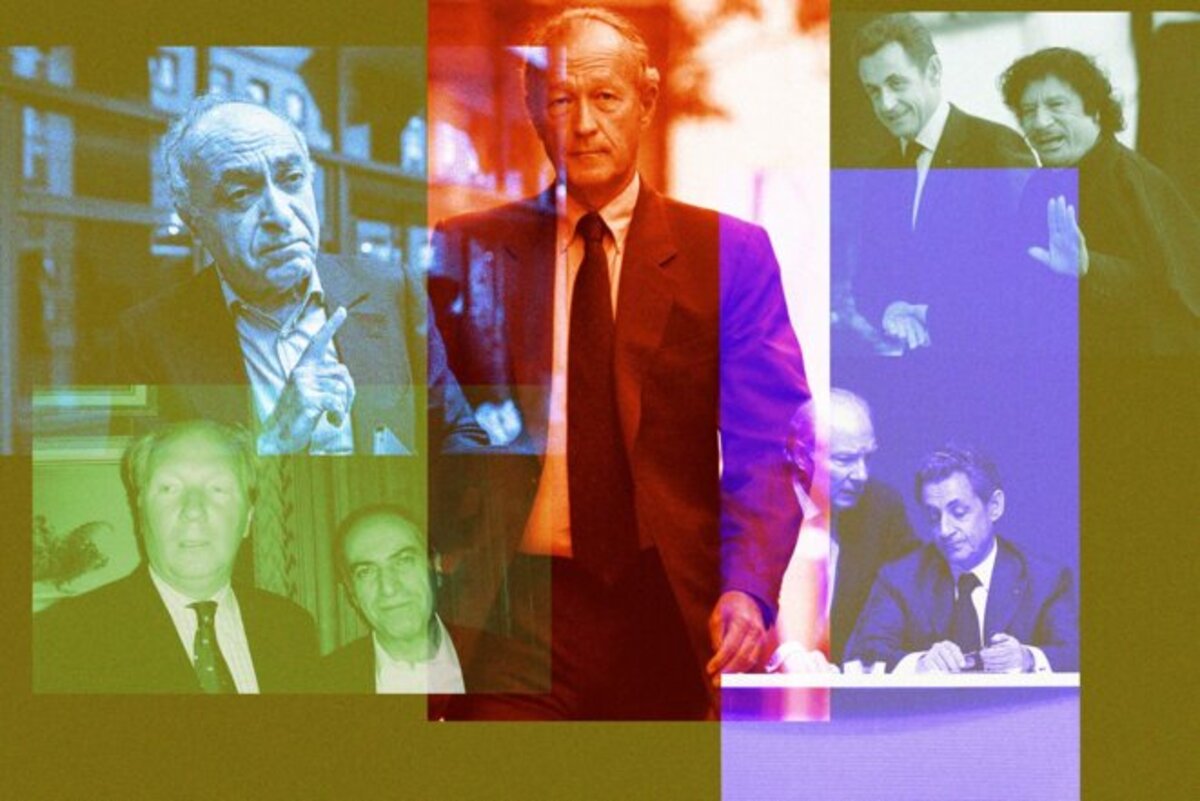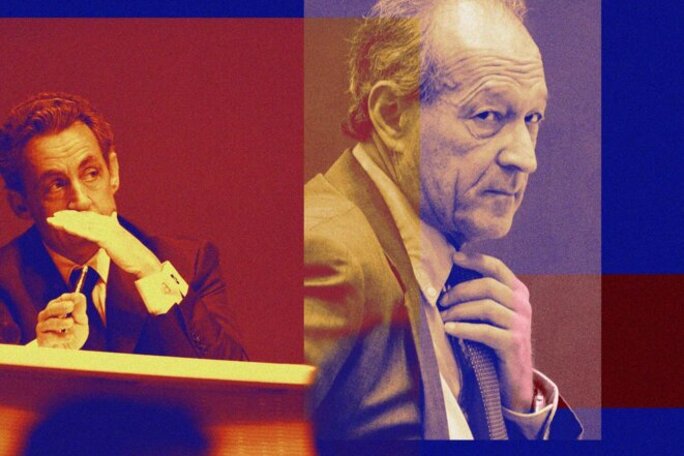Thierry Gaubert was a close friend and political ally of former French president Nicolas Sarkozy throughout the latter’s political ascension, beginning in the early 1980s when Sarkozy was elected mayor of the wealthy Paris suburb of Neuilly-sur-Seine.
In 2020, Gaubert, 71, was placed under investigation for “criminal conspiracy” in the ongoing French judicial investigation into the suspected illegal financing of Sarkozy’s 2007 presidential election campaign by the regime of the late Libyan dictator Muammar Gaddafi.
Nicolas Sarkozy has vigorously denied any wrongdoing.
Gaubert is suspected of significant involvement in the organisation of the alleged funding following the examination by police of a computer hard disk and a flash drive belonging to him, and which provide further damning evidence of the established dealings between Sarkozy’s close political team and the Gaddafi regime.
As Mediapart detailed in the first part of this two-part investigation, the storage devices, discovered and examined by the French police’s anti-corruption branch earlier this year, had remained in police evidence stores since 2011 after they were seized in a separate case.
The documents contained on them not only contradict Sarkozy’s claims of having long lost contact with several protagonists in the case, including Gaubert, but also demonstrate Gaubert’s very active role as a discreet go-between for Sarkozy’s political team in its dealings with Tripoli, and also with businessman and intermediary Ziad Takieddine, suspected of playing an essential role in the alleged secret funding by Tripoli.
In this second and final report on the extraordinary revelations emerging from Gaubert’s computer files, Fabrice Arfi and Karl Laske detail the relations tied as of 2005 between Sarkozy’s close political entourage and the Gaddafi regime, and Gaubert’s continuing role behind the scenes before and after the 2007 elections.
***
Before his election as president, Nicolas Sarkozy served as a minister under the second, 2002-2007 presidency of Jacques Chirac. He entered Chirac’s government in 2002 as interior minister (see part one of this report) before briefly serving as economy and finance minister in 2004, after which he was re-appointed, in 2005, as interior minister. He had by then made no secret of his ambition and preparations to become the conservative UMP party’s candidate in the 2007 presidential elections.
Throughout that five-year period, Claude Guéant, a key figure among those suspected of organising the alleged Libyan funding, served as his chief of staff. After his election, Sarkozy appointed Guéant as secretary-general of the presidential office, the Élysée Palace, and later as interior minister.
Another central figure in the Libyan funding probe is Brice Hortefeux, who had been, and remains, a friend of Sarkozy’s since their teenage years, and who, like Gaubert, has for decades been a loyal political ally. In 2005, Hortefeux was then Chirac’s junior minister for local authorities, working under the authority of the interior minister, Nicolas Sarkozy.
Paris-based French-Lebanese businessman Ziad Takieddine developed a major role with Sarkozy’s aides as an intermediary in business and political contacts with Arab countries, and in 2005 he was opening the doors of the Gaddafi regime to them. Takieddine acted as an intermediary for the sale to Libya of French espionage technology, while also organising, in fine detail, the visits to Tripoli by Guéant, Hortefeux and Sarkozy.
During questioning in October 2021 by police assigned to the judicial investigation into the suspected Libyan funding, Takieddine’s former British wife, Nicola Johnson, recalled a scene at the couple’s Paris town-house home, which she said occurred in 2005. This was during the period when her then husband was highly active in organising contacts and meetings between Sarkozy’s aides and the Gaddafi regime, including the trips to Libya.
“I know that at least on one occasion Brice came to the house to pick up cash that Ziad gave to him,” she said in her statement. “He [Ziad Takieddine] spoke about having to give cash to Brice, which he did not have. He looked everywhere. I saw Ziad prepare the envelope, but I wasn’t present for the handing over. Ziad went down on his own when Brice arrived. So yes, Brice had cash.” She added that Takieddine would mostly carry bank notes of large denominations.
Questioned in turn about the visit made by Brice Hortefeux, Thierry Gaubert’s former wife Hélène Karageorgevitch, who was a friend of Johnson’s, said that “Nicola spoke to me about it straight after”.

Enlargement : Illustration 1

In 2005, Takieddine was present at two separate meetings he had organised in Tripoli between Sarkozy’s aides and Gaddafi's brother-in-law and security chief Abdullah Senussi. The judicial probe has identified Senussi as a central figure in organising the alleged secret funding of Sarkozy’s election campaign.
At the time of the meetings in 2005, Senussi was the subject of an international arrest warrant issued by France after a Paris court, six years earlier, had sentenced him, in his absence, to life imprisonment for masterminding the 1989 in-flight bombing of a French UTA airline passenger plane over Niger, in which 170 people lost their lives.
The first of those meetings organised by Takieddine involved Claude Guéant, Sarkozy’s chief of staff, who met with Senussi in Tripoli on October 1st 2005. That was followed, on December 21st with a meeting, again in Tripoli, between Senussi and Brice Hortefeux, then junior minister for local authorities at the French interior ministry.
On both occasions, Takieddine was the only other person present. The circumstances of the meetings were extraordinary; Guéant and Hortefeux, two senior French interior ministry officials, were involved in secret discussions with a man wanted by France for a horrific act of terrorism that cost the lives of French citizens. Moreover, they did so without alerting French diplomatic channels or intelligence services, meeting Senussi without any security escort, and without an official interpreter. Those circumstances were denounced by French diplomats and former intelligence officials when they were questioned by the judicial investigation.
The meetings are a key part of the probe for two reasons. One is that it has established that Sarkozy’s team, notably through both the interventions of Sarkozy’s personal lawyer, Thierry Herzog and the efforts of Claude Guéant, strived, between 2005 and 2009, to find a legal loophole for overturning the international warrant for Senussi’s arrest.
The other is that it was Senussi who, in early 2006, sent 2 million euros from Libyan state funds into the offshore account of a company belonging to Ziad Takieddine, out of which 440,000 euros were then sent on by Takieddine to a secret account in The Bahamas belonging to Thierry Gaubert.
It is a long-held suspicion that Takieddine’s key mission for Sarkozy’s team was to gather funds for the presidential campaign, and the documents found on Gaubert’s hard disk reinforces that hypothesis. On January 23rd 2006, Gaubert wrote up a note referring to “NS-campaign”. Six days later he sent an email to Takieddine in which he wrote: “Have a pleasant journey and I wait for your call.” This appears to refer to a flight taken by Takieddine from Tripoli back to Paris, the day before Senussi transferred the 2 million euros.
Meanwhile, new documents obtained by the French probe from the Swiss authorities, in the framework of a judicial cooperation agreement, show that between the end of 2005 and early 2007, Takieddine withdrew cash sums totalling 1.1 million euros from a Credit Suisse bank account in Geneva. The money in the account was, the judicial investigation believes, sent from Tripoli. The French investigators have already established that Sarkozy’s 2007 election campaign used cash sums that were undeclared to the official watchdog that oversees campaign spending.
Questioned about what she knew of Libyan funding of the campaign, Takieddine’s former wife Nicola Johnson told the investigation: “I knew that my husband had relations with Claude Guéant, Brice Hortefeux and Thierry Gaubert. I was a witness to phone conversations, or dinners, [and] meetings at the house. He spoke of Libya with those people.”
“Gaubert was interested in Libya, for political reasons, for questions of the financing of the campaign, and it was in order to have funding for the campaign that Senussi had to be helped,” she added. “These are things that Ziad raised with Brice, when he was alone, with Gaubert when he was alone, and sometimes when all three were together.”
Other evidence found in Gaubert’s computer archives refers to these secret encounters. This concerns an email dated March 27th 2006 in which Gaubert writes about a meeting with Takieddine and a document prepared by the latter which “CG must give to BH”.
Throughout the following 14 months that led up to Sarkozy’s election, Gaubert’s role remained discreet, hidden from view. However, on the afternoon of the second and final round of voting in the elections, on May 6th 2007, he sent an email, as found in his computer files, to a friend giving him the confidential estimations of the forthcoming result established by the interior ministry at 3.50 pm that day. In another sent at the end of the afternoon to the same friend he wrote, “I’m at the interior”, a reference to the ministry.
The Élysée years
On May 6th 2007, Nicolas Sarkozy was elected as French president, beating his socialist rival Ségolène Royal with a 53.06 percent share of votes cast.
The police examination of Gaubert’s computer files found an invoice issued by a small aviation company, Cavok, for a flight by private jet on May 10th 2007 from Paris Le Bourget airport to the town of Clermont-Ferrand in central France. Written with a question mark in the column of the invoice identifying the client was “UMP?”. The UMP was Sarkozy’s conservative party (now renamed Les Républicains). In the column detailing the itinerary was added: “With Mr Ziad Takieddine.”
The agendas of Brice Hortefeux, seized by the judicial probe, show that that same day he was due to fly to Clermont-Ferrand.
It was an indication of how the closeness between Sarkozy’s circle and Takieddine (who would years later be ostracized by them) had not diminished following Sarkozy’s victory. Also found on Gaubert’s files was a note dated June 12th 2007 in which he again refers to “doc ZT”. The judicial investigation has discovered that Takieddine had, the day before, written up a report on a Word document, recorded on his own computer, on the subject of Libya. It began: “Colonel Gaddafi wishes to see a new page opened in relations with the new French president.” Sarkozy made an official visit to Tripoli in July 2007, two months after his election.
Intriguingly, Gaubert, in the same note, wrote “CG phone number for Sanous [sic]”. In different documents written up by Takieddine, he referred to Abdullah Senussi as “Sanoussi”.

Enlargement : Illustration 2

In December 2007, Muammar Gaddafi was welcomed to France by Sarkozy, who rolled out the red carpet for the dictator’s six-day state visit, an invitation that caused uproar among opposition parties and rights groups and which was even publicly criticised by a junior minister in Sarkozy's government.
When Sarkozy became French president, he again appointed Claude Guéant as his chief of staff, this time with the powerful post of secretary-general of the presidential office, the Élysée Palace. The judicial investigation has established how, three months after Gaddafi’s state visit, Guéant received 500,000 euros via wheeler-dealer Alexandre Djouhri, suspected of being another key intermediary in the Libyan funding story. The money was originally part of a much larger sum transferred from Libya to Djouhri by Bashir Saleh, Gaddafi’s chief of staff. The 500,000 euros were for Guéant’s personal use in his purchase of an apartment in central Paris.
Djouhri, who has also been close to Sarkozy for many years, and Takieddine were rivals, both operating as intermediaries in the same spheres.
Under questioning, by both the police and the investigating judge in charge of the judicial probe, Sarkozy, who has described Takieddine as a “liar” and “mad”, maintained that he had not had any type of contact with Takieddine since 2004, and that they were never close. In one of his statements, Sarkozy said: “Relations between Mr Takieddine and myself have never existed at any moment nor at a any level, political, financial or amicable.”
But that was contradicted in another statement that Takieddine’s ex-wife Nicola Johnson gave to the investigation. She said she had a “very strong memory” of how Sarkozy had phoned Takieddine in June 2008 to offer him his condolences after the death of the French-Lebanese businessman’s mother. “Ziad was very sad and he received a call, it was Sarkozy,” Johnson said. “He greeted him, he called him ‘Mr President’. It lasted a few minutes, and my husband was very moved by that call, he found it touching that the French president call him.”
Her account was confirmed to Mediapart by Takieddine, speaking through his lawyer. The once Paris-based intermediary is now exiled in his native Lebanon, to where he fled after being handed a five-year jail sentence in June 2020 for his part in a separate illegal funding scam known in France as “the Karachi affair”.
Takieddine was, one of six men, including Gaubert, convicted for their different roles in the secret political funding , via French arms export deals, of the 1995 presidential bid by Sarkozy’s political mentor, Édouard Balladur.
Gaubert has appealed against his own conviction, which carried a sentence of four years in jail, two suspended. It was during the investigation into that case that the hard disk and flash drive now revealing fresh evidence for the Libyan funding probe was originally seized.
Gaubert’s archives also show that Takieddine remained very close to the Libyan dealings of Sarkozy’s aides, well after the latter’s election. In December 2009, Gaubert received a message from Takieddine to tell him of an “unofficial” meeting he hosted at his Paris town house between Guéant and Gaddafi’s son Saif al-Islam, an influential figure in the Tripoli regime. In that same message there was mention of confidential meetings with “B”, which the investigation suspects is a reference to Brice Hortefeux.
It was two years later, during the separate investigation into the “Karachi affair”, that other computer files and notebooks were seized from Gaubert’s home. They were found to contain Libyan documents, phone numbers of officials of the Gaddafi regime, and also an Interpol “red notice” issued for the arrest of a head of protocol within the regime.
In a transcription of police phone taps of a conversation between Gaubert and Hortefeux, which took place as the Karachi affair investigation progressed, Gaubert told Hortefeux: “I think it’s spread to other matters. In my opinion it’s spread to the rest.”
In the ongoing judicial investigation, launched in 2013 – two years after Mediapart’s first revelations about the suspected Libyan funding – and led first by Judge Serge Tournaire and now by Judge Aude Buresi – seven people are now formally placed under investigation (under French law, a person can only be placed under investigation if a magistrate establishes serious and – or – concurring evidence that they committed a crime). They are:
- Nicolas Sarkozy, for “corruption”, “criminal conspiracy”, “illicit campaign financing” and “receiving the proceeds of the misappropriation of public funds”.
- Claude Guéant, for, notably, “criminal conspiracy”, “corruption”, “receiving the proceeds of the misappropriation of public funds”, “illicit campaign financing” and “moneylaundering the proceeds of tax fraud”.
- Brice Hortefeux, for “criminal conspiracy” and “illicit campaign financing”.
- Thierry Gaubert, for “criminal conspiracy”.
- Éric Woerth, (treasurer of Sarkozy’s 2007 election campaign) for “illicit campaign financing”.
- Ziad Takieddine, notably for “corruption”, “criminal conspiracy”.
- Alexandre Djouhri, notably for “corruption” and “criminal conspiracy”.
Under French law, they all benefit from a "presumption of innocence" unless found guilty in court.
Contacted by Mediapart for their reaction to the issues raised in this investigation, Nicolas Sarkozy and Thierry Gaubert did not respond.
Also contacted by Mediapart, Brice Hortefeux said he had no particular comment to make other than that he has formally denounced “since several years the untruths and factual errors” in the case, without providing further detail.
For his part, Claude Guéant told Mediapart that he had “never had the knowledge that Thierry Gaubert looked after anything whatsoever in relations with Libya”, and that he had “never seen or heard mention of Libyan funding” for Sarkozy’s 2007 election campaign.
-------------------------
- The original article in French on which this two-part report is based, can be found, in full, here.
English version by Graham Tearse
-------------------------
If you have information of public interest you would like to pass on to Mediapart for investigation you can contact us at this email address: enquete@mediapart.fr. If you wish to send us documents for our scrutiny via our highly secure platform SecureDrop please go to this page.
-------------------------



